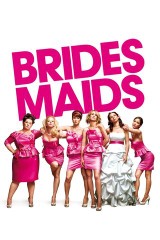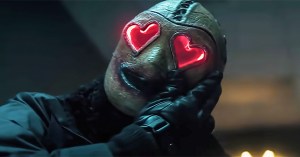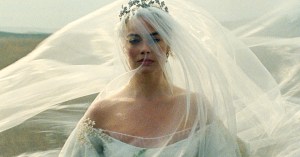21 Most Memorable Movie Moments: Food Poisoning at the Bridal Store from Bridesmaids (2011)
Co-writer Annie Mumolo and director Paul Feig reveal the scene that was cut to make room for the monumental gross-out – and how their raunchy, moving comedy changed Hollywood.
Watch: Co-writer Annie Mumolo and director Paul Feig on the making of Bridesmaids above.
In 2019, Rotten Tomatoes turns 21, and to mark the occasion we’re celebrating the 21 Most Memorable Moments from the movies over the last 21 years. In this special video series, we speak to the actors and filmmakers who made those moments happen, revealing behind-the-scenes details of how they came to be and diving deep into why they’ve stuck with us for so long. Once we’ve announced all 21, it will be up to you, the fans, to vote for which is the most memorable moment of all. In this episode of our ‘21 Most Memorable Moments’ series, Bridesmaids co-writer Annie Mumolo and director Paul Feig remember the notorious food-poisoning scene and the fantasy sequence from the original script that it replaced.
VOTE FOR THIS MOMENT IN OUR 21 MOST MEMORABLE MOVIE MOMENTS POLL
THE MOVIE:
Few comedies have rocked the movie industry like Bridesmaids did back in 2011. From the first draft of the script to a South by Southwest debut that had Hollywood talking, to a mega opening weekend and multiple Oscar nominations, this was always going to be a special comedy for the beginning of the new decade. But what makes the story of out-of-luck bridesmaid Annie (Kristen Wiig) stand out from so many other buzzy and celebrated comedies is that its impact has lasted, and continues to this day – not just in the career boosts it gave its leads and director, but in the way it changed the playing field for female-driven comedies and the creative minds who wanted to make them. It all started, according to co-writer Annie Mumolo, with an exciting meeting with a Hollywood producer… that never ended up happening, and her own experience as a “perpetual bridesmaid.”
“That planted the seed for us. We thought, ‘Oh, maybe we should write something together.’”
Annie Mumolo: “Kristen [Wiig] and I had been writing and performing together at the Groundlings for years. We had an instant sort of chemistry there and we just had a lot of success with our sketches that we wrote together. So at one point a Hollywood producer approached us after a show and said, ‘You guys, you two have really good chemistry. I’d love to have a meeting with you.’ At the same time, we had been talking about ‘maybe we should think of writing a movie sometime.’ And when he approached us we were very excited, [and] we exchanged information. Then we called him and he never called us back. That was it – I don’t know. A bizarre thing. But it kind of planted the seed for us. We thought, ‘Oh maybe we should write something together.’”

Kristen Wiig and Annie Mumolo (who featured in a scene) in Bridesmaids (Photo by Suzanne Hanover/©Universal Pictures)
“Everyone I knew was getting married. All my cousins and friends. And I was a perpetual bridesmaid.”
Mumolo: “At the same time, everyone I knew was getting married. All my cousins and friends. And I was a perpetual bridesmaid. I was encountering all kinds of characters in my adventures. So we started talking about that idea and that was where it started. One moment that I think the whole emotional anchor of the movie came from was a moment [at my friend’s] wedding reception. You know how there’s that big dramatic run out of the building, and they get into their car and drive away? And everyone’s celebrating? I remember my last friend that got married, and the feeling I had as they ran out, got into their car – it was this very deep feeling of being left behind. I just remember standing there. You’re very happy for them, and you want this to be happening to them, but you have this complicated sort of feeling. Because it makes you question, ‘Am I doing what I should be doing?’”
“Within five minutes I got a call from Judd saying, ‘Alright we’re going to do this.’”
Paul Feig: “It was in 2007, I was working on another movie and Judd [Apatow, who produced Bridesmaids] called me up and said, ‘Hey, we’re doing a reading of this script that Kristen Wiig wrote.’ Kristen had just been in a movie I did called Unaccompanied Minors, and it was the first time she had ever been in a movie and I just loved her. I thought she was so funny, so I went to that script read. (One of the ironies is that Melissa McCarthy was one of the people reading, but she was reading other roles; she wasn’t even reading that role.) I’d always been wanting to do much more female-led comedy and projects in general, so after the read we all gave Kristen and Annie a bunch of notes and all that. Then I was busy with my movie, and then I would check in with Judd about that one occasionally, and he was, ‘Oh we’re not sure what’s going on yet,’ and then a year-and-a-half later he basically said, ‘It looks like it’s dead.’ [I said] ‘That’s such a bummer because it was such a great chance to have all these great women [in a film together].’ Then it was 2010 when I got a call from my agent saying that that movie was actually going to go. They put me on list of possible directors to Judd and within five minutes I got a call from him saying, ‘Alright we’re going to do this.’”

Paul Feig and Kristen Wiig on the set (Photo by Suzanne Hanover/ ©Universal Pictures)
“I believed so strongly from the beginning there was an audience for this. I just knew it.”
Mumolo: “All women that I know are very, very funny in their own way. And we really wanted to tap into that. I believed so strongly from the beginning there was an audience for this. I just knew it. And so did Judd. I remember there was an article I found, like in Entertainment Weekly or something, at some point, that said women make up to 60% of the moviegoing audience and yet there were no movies [being made for them]. This was back then; there were not a lot of movies that featured women. The women always in comedy tend to be sort of just an accessory: The wife holding a tray of lemonade, and [saying], ‘Honey, you’re not going to go be crazy again are you? Uh-oh.’ The sort of baking, no-opinion woman who just stands there and holds lemonade. Or is always just watching her crazy, funny male partner have all the fun and be funny. But that was because you write what you know. And when men are writing movies, they write what they know. So we really just wrote what we knew. We didn’t set out to make any grand statements or anything. We just felt like this should be done. So we did it.”
THE MOMENT: Food Poisoning Strikes at the Bridal Store
Feig recalls clearly the gory details of Bridesmaids’s most infamous scene – in which, after eating at a Brazilian restaurant chosen by Annie in an effort to upstage her rival Helen (Rose Byrne), the bride and her bridesmaids are struck down by food poisoning and proceed to s—t and vomit all over the bathroom of an upscale bridal store (and in one case, on the street outside). The filmmakers designed a pristine white set on which to stage the carnage, and made buckets of vomit from oatmeal, chopped peas, carrots, and other vegetables for maximum gross-out effect. It was to be the movie’s big “water cooler” moment, and it was one that was both hilarious and groundbreaking – these were comic actresses going for it in the kind of scene only men had been allowed to play in the past. But it was a somewhat controversial sequence behind the scenes: the dress-shop moment played out very differently in Wiig and Mumolo’s original script – no oatmeal was required – and the two writers were not eager to change directions. At least at first.
“Naturally she sees Christian Bale there, who’s chopping wood without a shirt on…”
Mumolo: “We had a fantasy sequence where they go into the dress shop, and Kristen’s character tries on this dress and she has this fantasy that when she wears this dress, she’s all of a sudden in a castle. And all the men at the wedding are fawning over her. There’s so many of them wanting her so badly [that] just to escape from the castle she goes running out into this field and runs into the forest. And she naturally sees Christian Bale there, who’s chopping wood without a shirt on. And they end up on a bearskin rug, and he was combing her hair, and it was this expansive sequence of her little love affair with Christian Bale. In the meantime, [back in the real world] Helen gets the women to get the dress she wants because Annie is caught up in her fantasy. So that was the original [scene]. And then I think Judd said at one point we’ll never get Christian Bale to do this. And then we tried to put in Matt Damon and then we’re like, ‘As if we’re going to get Matt Damon to do this.’ He was concerned we weren’t going to get anybody to do it. And also he felt it needed harder comedy there, rather than what we had. So, we sadly let that go. We did not want to let that go. We loved that sequence.”

(Photo by Suzanne Hanover/ ©Universal Pictures)
“This sequence doesn’t have enough hard comedy.”
Feig: “[The scene] was very funny but when we were in the re-write process, we all kind of felt like well maybe there’s something that’s a little more real-world that we can do with this that doesn’t involve a fantasy sequence. It just came from a lot of talk about, ‘Well, what is her problem?’ Her problem is she doesn’t have any money but she’s trying to keep up with Helen and trying to look like she can outdo or match Helen and all these opulent things that Helen is doing for Lillian [played by Maya Rudolph]. And it just became, ‘Well what if she overextends herself and takes them to a restaurant that’s cheap but she passes it off as being a great place?’”
Mumolo: “I think what Judd said was, ‘This sequence doesn’t have enough hard comedy.’ It was a Friday night, and we had until Monday. He said, ‘Go write something that ends with they all get food poisoning and Megan s–ts in the sink.’ I think [that] is what he said. Of course, when you hear something that way … it’s not going to sit well in the beginning. We went off and did our version. We had to sort of bring the female perspective into how a woman would deal with having food poisoning and trying to cover it up. On the day we started shooting it, while we were shooting it, we started feeling much more at peace with it. We both felt much more relieved, seeing how Paul handled it and seeing his approach to it. And Judd said we’re going to shoot many versions of this, from the most conservative to the most – what’s the word – the most extreme.”
“The funniest thing was just how everybody handles it up until the point when it all falls apart.”
Feig: “I know when that idea was come up with, Kristen was kind of like, ‘Wait what? What’s going to happen?’ Because – very rightfully so – she was nervous that Judd and I, two guys who come from the rough and tumble world of comedy, were going to turn it into a guy’s version of a woman’s movie. And that’s a very, very real concern. But we always just told her… this is the emotional reason why this is here and so this will illustrate this point in a very funny way and also in a way that will showcase her comedy. We wanted a big, physical water cooler scene set piece, as they call it in comedy, that could be super funny and active and really get some attention. But also none of us wanted to do a scene which is just going to be mayhem for mayhem’s sake. To us the funniest thing was just how everybody handles it up until the point when it all falls apart. Will [Annie] admit to her enemy that she did something wrong? And so that’s really what that scene’s about. It could’ve easily just been, oh everybody’s throwing up and s–tting and all of that, and shot at crazy wide angle lenses and just going far, far, far. But it just wouldn’t have been funny without being grounded by the fact that there’s Annie in the middle of it as everything is falling apart around her and all the evidence points to the fact that she really screwed up badly and she just won’t admit it.”

Wiig with Rose Byrne who played Helen (Photo by Suzanne Hanover/ ©Universal Pictures)
“It took about eight or nine test screenings to get the exact math right.”
Feig: “We shot more sequences, too, where Becca [Ellie Kemper] runs in and finds everybody and the bathroom’s full with everybody throwing up, [and] she goes running down the hall thinking there’s another bathroom at the end and runs into Whitney – the woman who runs the dress shop – throws opens the door of her office thinking it’s a bathroom and projectile vomits across this pristine, white office. And all over this wedding photo of Whitney and her husband. That was one of the first ones we cut out because when we put the sequence together, we’re like OK, that’s just a bridge too far. At that, we’re just settling, just letting the grossness drive us and not the emotional underpinning. But honestly it took about eight or nine test screenings to get the exact math right on that dress shop sequence, because there was some we let go a little too long and others we made too short. It was really having to discover how far we could push the audience without them turning on us. We found we could actually push them pretty far.”
THE IMPACT: Turning on the Green light
Bridesmaids earned $288 million at the global box office and picked up two Oscar nominations: one for Melissa McCarthy for her star-making turn as Megan, and one for co-writers Mumolo and Wiig for Best Original Screenplay. Those numbers and accolades are rarely seen for R-rated comedies – particularly those with scenes that require so much oatmeal. But it’s those numbers that shook the industry. With Bridesmaids proving false the long-held assumption that female-led comedies couldn’t make money, there was a shift. Blockers, Girls’ Trip, Rough Night, Pitch Perfect, Spy, The Heat, and more films would follow; movies where strong friendships took center stage and romance was absent or secondary, movies where women could be flawed, and real, and funny. Many would say the shift hasn’t been big enough, but Bridesmaids showed many in power what Mumolo had known all along: there was an audience for this movie and more like it.
“We jumped in the car and drove to the ArcLight in Hollywood and found a packed theater just absolutely rocking with laughter.”
Feig: “Our budget was $32.5 million and we were told we had to make $20 million opening weekend or else we’d be considered a failure. We were tracking to make $13 million and so I was walking around that week just despondent. It was only [better] as the matinees went on [opening] Friday, when the calls starting coming in like, ‘Well it’s actually looking more like 15’ and then, ‘Oh well maybe it might be 17.’ I invited Melissa and her husband Ben [Falcone] over to our house for dinner. The four of us, with my wife, we’re all sitting around having dinner as day went into evening and I started getting emails – ‘Well it’s actually looking like $19 million,’ then we got the one where it was like, ‘It actually looks like it’s going to hit $20 million.’ I was like, ‘Oh my God.’ By the time it went up to 26 we all just went like, ‘We got to get to the theater.’ So we all four of us just jumped in the car and drove to the ArcLight in Hollywood and ran in and found a packed theater just absolutely rocking with laughter. That was the moment you just go like, ‘Oh thank God.’”

Mumolo and Wiig at the 2012 Academy Awards (Photo by Matt Brown/ABC via Getty Images)
“If you are to be nominated for an Oscar tomorrow, what number should we call you at?’”
Mumolo: “They give you a phone call the night before and they say, ‘If you are to be nominated for an Oscar tomorrow, what number should we call you at?’ You give them your number. You’re like, ‘Haha that’s really funny, that’s hilarious, OK, good night.’ I think I felt as though, maybe intentionally, psychologically, I couldn’t wrap my head around that. So something just shut off and I went to bed. And then they called. My husband was in the other room and he started [screaming], ‘Hey look! Get up!’ And so that’s how I found out.”
“The industry was going to wait and see how we did at the box office before they could even consider green-lighting other movies starring women.”
Feig: “The biggest thing that changed is that the studios saw they can make money off of female-driven comedies. Hollywood is not an altruistic town. We are, as far as our politics and all that, but when it comes to the business, money talks, and you can pitch people all day that they should do a movie because it’s the right thing to do and we need representation and we need this and that, but if it doesn’t make money, then they don’t care, basically. That was the thing that was kind of held over our head the whole [time] through production and even up until the day we got it released. It was looked at as being this sort of oddity, this risky thing that we were doing. The whole industry was going to have to wait and see how we did at the box office before they could even consider development and green-lighting other movies starring women. Which was crazy. So much pressure was on it that if it didn’t do well, the town was going to go, ‘Well, see, movies starring women don’t work.’ Which is insane, because nobody ever says that when a movie starring a bunch of men doesn’t do well. They just go, ‘OK, the movie didn’t work.’ I had female friends who were writers who had pitched ideas, and they were being told around town, ‘We have to wait and see how Bridesmaids does.’”

The reviews were raves and the marketers leant into the idea of a smart, R-rated female-led comedy (Photo by @ Universal Pictures)
“It’s like birthing a baby. And it went on for such a long time.”
Mumolo: “The movie for all of us in the beginning was like having a baby. It’s like birthing a baby. And it went on for such a long time. And there are wonderful, joyful moments. There are moments of despair, there are moments of anxiety, there are moments of relief. I mean it’s such a tremendous experience. There were so many things that changed me as a person. When it comes to that one scene, it was a blip in a six-year experience. But I’m very grateful that it makes people laugh. And that’s what we set out to do. That part of it makes me happy.”
Bridesmaids was released on May 13, 2011. Buy or rent it at FandangNOW.









